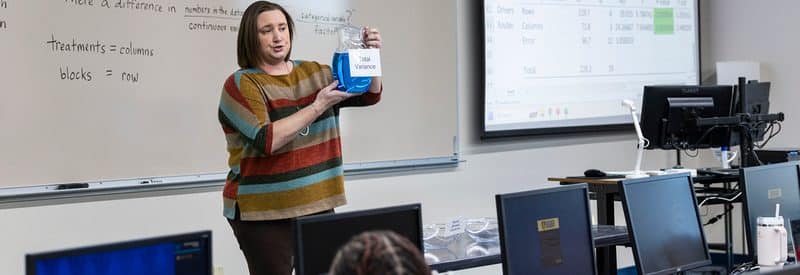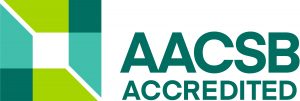Business Analytics
at Southern Arkansas University
Average Graduate Tuition and Fees Per Year | ||
In-State | Out-of-State | |
SAU | $6,894 | $9,810 |
Arkansas | $7,702* | $13,663* |
Texas | $7,502* | $16,686* |
Louisiana | $9,748* | $19,310* |
*Tuition and fees are calculated as an average of public four-year universities’ published tuition and fees. Source: Department of Education
Our programs are routinely recognized as the best value programs nationally. SAU offers out-of-state tuition waivers to students from Louisiana, Mississippi, Missouri, Oklahoma, Tennessee, and Texas who chose to live in university housing or reside in a bordering Texas county or Louisiana parish.
About the Master of Science in Business Analytics
Master the analytics tools needed to problem solve and make strategic decisions in a business setting with a Master’s of Science in Business Analytics. This is a flexible program that only requires 30 hours to complete.

Core Courses (24 Hours)
- ACCT 6003 – Accounting for Decision Making
- ECON 6003 – Managerial Economics
- FIN 6003 – Managerial Finance
- IS 5313 – Data Visualization
- MGMT 6043 – Business Analytics
- MKTG 6023 – Strategic Marketing
- SCM 6003 – Enterprise Resource Planning
- SCM 6013 – Project Management
Elective Courses
Select 6 hours from the following:
- IS 5323 – Information Systems Analysis
- IS 6023 – Research Project
- IS 6983 – Field Experience in Data Analytics
- SCM 6033 – Supply Chain Security
- SCM 6053 – Supply Chain Industry 4.0 Technologies
- SCM 6063 – Supply Chain Management
- SCM 6143 – Sustainable SCM Practices
The M.S. in Business Analytics is offered by the Rankin College of Business at SAU and is fully accredited by AACSB International, the premier accrediting body for colleges and schools of business. Fewer than 5% of all business programs worldwide are accredited by AACSB, which indicates the quality of our program.
GMAT not required. Must meet admission requirements for the School of Graduate Studies.
Undergraduate Course Requirements
A student may be admitted into the MS. BA program if he/she holds a bachelor’s degree or equivalent from an accredited college or university regardless of the undergraduate field of study. Should a student have an undergraduate degree other than business, prerequisites would include:
- Survey of Accounting (Sophomore or above),
- Three hours of business finance or financial management (junior level or above),
- Three hours of statistics (at the junior level or above),
- Three hours of principles of marketing (at the junior level or above),
- Three hours of micro-economics (sophomore level or above), and
Specific Degree Requirements
The MSBA Curriculum is designed primarily for graduates of a Bachelor of Business Administration Program, but graduates of other programs can enter the program by completing a 15 hour prerequisite program.
The MSBA program will consist of 24 hours of core courses and six hours of electives. A student can choose to complete courses in a traditional night program, through online delivery, or through a combination of the two.
| Department: | |
| Hours Required: | 30 |
| Categories: | Graduate |
| Completion Time: | 2 years * |
| Delivery: | Hybrid, On-Campus, Online |
* Based on 2 classes per semester including summer
Data analytics makes decision-making five times faster in a business setting, so it is no coincidence sixty percent of companies around the world use data and analytics to develop strategic plans for their businesses and maximize cost-efficiency. With this degree, candidates will learn how to analyze large data sets and generate data-informed business reports which provide insights on how to boost productivity. The career field of business analytics is constantly growing, with a projected growth of 25% percent by 2030.
Learning Goals
- MSBA students will be effective communicators, using information technology to enhance decision-making through better communication.
- MSBA students are prepared to be socially responsible, effective business leaders with an awareness of cultural and diversity issues and the ability to make ethical decisions.
- MSBA students will be critical thinkers who are able to use concepts from strategic management to integrate relevant information, decision-making techniques, and concepts from multiple business disciplines to make decisions in new or unfamiliar circumstances.
- MSBA students can effectively and legally access and use information to prepare an effectively written report that supports decision-making.
- MSBA students will be competent in the business discipline.
data analyst, ssps, analytics, big data, conversion
Program Contact
Dr. Christie Hough
Associate Professor of Management
Rankin College of Business
crhough@saumag.edu
870-235-4305
About SAU
Southern Arkansas University offers personalized tour visits, faculty and staff who care about student success, and a caring campus community. SAU also offers traditional and unique academic degree programs that are ranked nationally for quality and affordability.
Nestled in a quiet and beautiful part of south Arkansas, SAU is a great place to call home and to study a broad range of academic programs, including some unique offerings to the state and region. Along with boasting a complete college experience on campus, the University is a short drive from outdoor activities and is central to many regional hubs, such as Texarkana, Shreveport, Little Rock, etc.
Established in 1909, SAU has built on its dedication to student achievement and continues to grow, both on campus and online, with more than 80 degrees in four distinct colleges and the School of Graduate Studies
"*" indicates required fields

